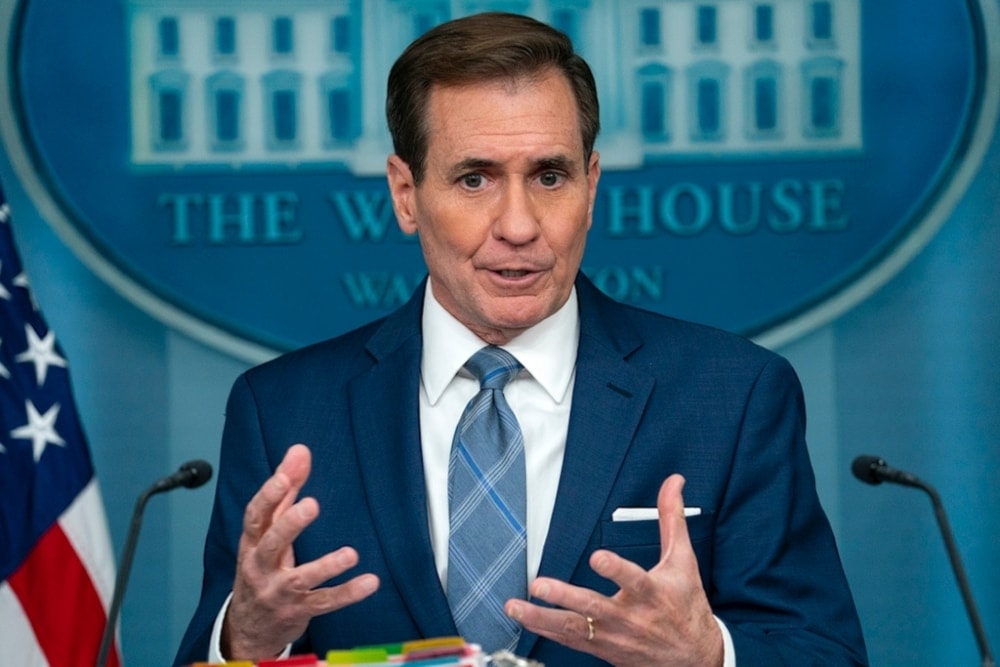Recent 'Israel'-Hezbollah escalation didn't derail ceasefire talks: WH
National Security Council spokesperson John Kirby calls Hezbollah's recent drone and rocket attacks "sizeable" but "different in scope than what we tend to see on a daily basis."
-

White House National Security Spokesperson John Kirby speaks during a press briefing, on Thursday, January 4, 2024. (AP)
The White House stated on Monday that the recent intense cross-border fighting between "Israel" and Hezbollah over the weekend did not disrupt the ongoing ceasefire negotiations for the Gaza Strip.
On Sunday morning, the Islamic Resistance in Lebanon - Hezbollah initiated its "initial retaliation" for the Israeli assassination of its senior military commander, Martyr Sayyed Fouad Shokor. Hezbollah attacked numerous Israeli military and vital targets, going as far as the Glilot base, located some 1.5 km from Tel Aviv.
Meanwhile, "Israel" claimed that in a "preemptive strike", it had targeted thousands of Hezbollah rocket launchers simultaneously with some 100 fighter jets.
Ceasefire talks are ongoing
National Security Council spokesperson John Kirby called Hezbollah's recent drone and rocket attacks "sizeable," noting they were "different in scope than what we tend to see on a daily basis between Israel and Hezbollah." Despite this, he assured that the attacks did not "not an impact on the talks in Cairo, and we're certainly glad to see that."
Kirby claimed that the type of attack seen on Saturday night was precisely the kind of escalation that Washington had been warning about in recent weeks.
The spokesperson stated that negotiators working on a ceasefire and prisoner swap are continuing their discussions in Cairo, in "working group" formats after meeting over the weekend. Brett McGurk, President Joe Biden's senior official for the Middle East, stayed in Cairo through Monday to support the process.
"I think it's safe to say that the issues they're going to be talking about are of a much more detailed, specific nature than we've typically been able to talk about," Kirby told journalists during a virtual briefing.
"The working groups are now meeting and talking, and so, there continues to be progress, and our team on the ground continues to describe the talks as constructive," he added.
Elsewhere in his remarks, he noted that one of the issues negotiators will address is a prisoner swap between Hamas and "Israel". This includes discussions on the number of individuals to be released, their identities, and the timeline for their release.
It is worth noting that talks for a ceasefire and prisoner-exchange deal have been ongoing for months now, but Netanyahu has made the process a difficult ordeal with his insistence on his latest demand: the continued occupation of the Philadelphi and Netzarim corridors.
Hamas reaffirms ceasefire demands after delegation departed Cairo
Hamas official Izzat al-Rishq issued a statement on Sunday detailing the outcomes of the recent negotiations in Cairo.
"The Hamas delegation left Cairo tonight, after meeting with Egyptian and Qatari mediators who briefed them on the results of the latest negotiations," al-Rishq said.
He indicated that the delegation demanded "Israel" adhere to the terms agreed upon on July 2, which are based on US President Joe Biden's speech and a UN Security Council resolution.
The official reaffirmed Hamas's readiness to implement these agreements, provided they protect the supreme interests of the Palestinian people and halt the ongoing aggression.
"Hamas reiterates its readiness to implement" the Biden plan, al-Rishq said.
He further reiterated the Palestinian group's key conditions for any potential agreement, including a permanent ceasefire, the complete withdrawal of Israeli forces from the Gaza Strip, the unrestricted return of displaced residents to their homes, comprehensive relief and reconstruction efforts, and a serious prisoner exchange deal.
Diplomatic efforts were originally intended to facilitate a ceasefire between Hamas and "Israel," with various mediators, including Egypt, Qatar, and the US, working to broker an agreement based on Biden's proposed plan.
However, these efforts have shifted focus following the introduction of new conditions by Israeli occupation Prime Minister Benjamin Netanyahu, some of which include the establishment of a permanent Israeli military presence in the Rafah area.
Consequently, the focus of diplomatic talks has shifted away from direct engagement with Hamas and toward broader discussions involving security arrangements along the Egyptian-Palestinian border, particularly with Egypt over the Philadelphi Corridor.
Netanyahu’s insistence on keeping Israeli forces stationed along the Philadelphi Corridor, which runs along the Egypt-Gaza border, has become one of the main points of contention on the way to an agreement.
Hamas, however, has expressed its firm rejection of "Israel's" continued control over the Philadelphi and Netzarim corridors and the Rafah crossing.

 4 Min Read
4 Min Read










